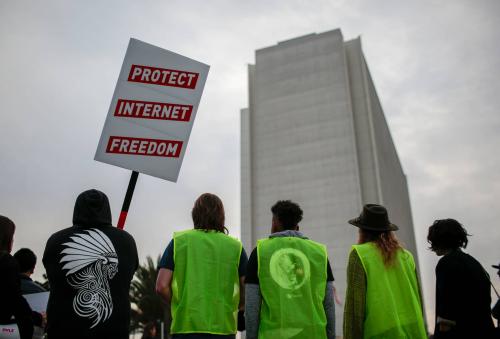President Joe Biden recently toured Europe with a simple message: “America is back.” Following the tumult of the Trump years, Biden attempted to repair frayed ties with U.S. allies and to build consensus on a series of ambitious policy goals: ending the COVID-19 pandemic, fighting climate change, and resolving issues around Big Tech and the internet. Indeed, on both sides of the Atlantic, policymakers are examining how to rein in the power of major technology companies. But despite broad agreement on this basic goal, U.S. and EU internet strategy aren’t as aligned as some politicians might proclaim.
In a bid to help bridge this divide, Biden and his EU counterparts agreed to form an EU-US Trade and Technology Council that will bring together officials from both sides of the Atlantic to write rules on a range of sensitive technology issues spanning investment to supply chains. But if Europe and the United States are to effectively promote democratic technology, the EU and the United States must prevent the Tech Council from falling into a clear and looming trap: becoming entirely about China.
Today’s world order is much different from the last time Biden held office, and China’s role in the global technology ecosystem is both more relevant and more strategically crafted. China’s two-prong strategy—its 14th Five-Year Plan (2021-2025) and the Long-Range Objectives Through the Year 2035—mark the end of export-led development and a move toward “dual circulation growth” designed to accommodate both domestic and external demand. This strategy places “indigenous innovation” at its core and aims to build a Chinese technology industry that is less dependent on foreign suppliers and more competitive in the global technology market.
The newly announced Trade and Technology Council is a clear bid to counter increasing Chinese government influence in technology. Although its founding document spends little time explicitly talking about China, the issues it aims to address are core to fears in the West that Chinese technological advancement represents a strategic threat. Accordingly, the council aims to address how the EU and the United States can collaborate to create compatible technology standards and build more resilient semiconductor supply chains. Both are ostensibly ways to stand up to the role China plays in global technology supply chains.
But by focusing too much on China in their pursuit of tech cooperation, the EU and the United States risk replicating the problems that have dogged the U.S. “internet freedom” agenda for at the least the last half-decade. Because of its heavy focus on Western values, that agenda has often come across as unrelatable and disconnected from current geopolitical realities and how the internet is perceived around the world. This has limited the attractiveness of liberal democratic internet governance models in many key internet “swing states.” Framing the TTC as a response to Beijing threatens to similarly limit the scope of its activities and ambitions. Responding to Chinese government and corporate internet practices is a different mandate than designing strategies and policies to promote technology innovation and democratic technology governance more broadly. Rather than a reactive approach focused on matching Chinese government activities with specific policy responses, the TTC would be better served by a proactive approach that boosts democratic technology governance and internet values while providing alternatives to today’s prevailing regulatory models of authoritarian internet control and corporate surveillance.
The risk of an overly reactive approach to Chinese policy has played out clearly at the UN’s International Telecommunications Union, where China has tried to advance its preferred vision of internet governance. China has pushed for internet standards to be developed at the ITU, a more state-controlled body that Beijing prefers over the multistakeholder Internet Engineering Task Force (IETF), where such rules have historically been written. An obsessive focus on combating Chinese government action has led to more drastic counterproposals, such as suggestions that Washington should respond to Beijing’s push for state-controlled internet standards by getting more involved in how U.S. firms engage in standards bodies. Yet such a move only risks mimicking Chinese behavior and would undermine the decades-old, multi-stakeholder internet standards-setting process, which is driven by voluntary adoption through a range of private companies, researchers, and other experts. Democratic states can combat these proposals without replicating them, such as by increasing their investment in ITU participation.
To be sure, there are key areas in which the United States and the EU should consider a more confrontational approach. The Chinese government’s activities vis-à-vis the internet are highly concerning, and its backing of telecom supplier Huawei has helped the company become entrenched in 5G infrastructure around the world, introducing a range of espionage risks. The United States has been vocal in drawing attention to these risks and encouraging allies to diversify their telecom infrastructure—work that might continue through the TTC. At the United Nations, it’s important that Europe and United States continue counter China’s attempts to normalize state control of the internet. Other technology issues that merit explicit confrontation with the Chinese government include, most significantly, its use of digital technologies to carry out genocide in Xinjiang.
But in many other cases, including on “models” of internet governance broadly, it is smarter to compete with China. In many ways, competition with the Chinese government to shape the internet’s future is unavoidable given the fact that Beijing is steadfastly advancing its technological capabilities, and this is not projected to end any time soon. Moreover, China’s vision of the future of technologies—one of central control, top-down management, and closed systems—is fundamentally at odds with that of the EU and the United States. Such systems do not guarantee innovation or growth and rarely scale. They are subject to bureaucracy and create single points of failure, which raise security and other questions of distrust. This system of “managed capitalism” may be good for China’s internal growth but undermines democratic structures of participation and inclusion. The Chinese government’s fundamental motivations around the future of the internet are not going to be altered merely by the EU and the United States taking a confrontational approach.
Instead, the internet’s decentralized and distributed architecture, its open standards processes, and its interoperable building blocks invite a more bottom-up and inclusive environment—one that is far more conducive to U.S. and EU innovation ecosystems than China’s more centralized system. Both the United States and Europe have strong innovation capabilities, which combined could create more appealing market alternatives than those offered by China. The openness of their governance systems is a strength rather than a weakness. In the long run, the United States and the EU have a real opportunity to develop a more appealing, proactive, positive vision of internet governance that isn’t just positioned against China. Here, the TTC could focus on becoming the megaphone that upholds the values the internet was built on, facilitating real, pragmatic, and inclusive governance structures. It can focus on developing attractive, positive models of internet governance that have greater appeal to many of the countries historically skeptical of western, liberal democratic (especially U.S.) internet policy proclamations. In doing so, the TTC might recruit more countries to protect this vision of an open internet in favor of more closed paths.
Finally, the TTC should look beyond China to acknowledge and adjust to the new world order. The multilateral world has changed significantly in recent years, and the influence of the West has declined. Consequently, the United States and, to a lesser extent, the EU are increasingly confronting a world in which they have less influence on key technology issues than they did a decade ago, as underscored by Russia and China’s successful coalition-building in the UN to draft a treaty on what they define as “cybercrime.” Moreover, China’s influence in the global south is growing, both because of the Belt and Road Initiative’s massive infrastructure investments and colonial history that causes suspicion of many Western initiatives. Today, the TTC might be used to foster coalition-building to support an open internet. A massive contributor to economic growth around the world, the open internet can be a key selling point to countries in the global south. Open, decentralized systems based on incentives rather than control might also be appealing to a global south that historically has been subjected to top-down governance and control by foreign powers. The TTC can become the hub that nurtures such initiatives.
In line with this new world order, the United States and Europe cannot pretend that the only threats to a democratic internet come from within authoritarian states. Democratic backsliding is occurring around the world—from far-right political parties across Europe, to violent attacks on the U.S. Capitol, to the Modi government’s growing authoritarianism in India.
Meanwhile, democratic governments have contributed to undermining the global, open, interoperable, and democratic internet by failing to pass robust privacy laws, allowing rampant corporate data collection, and pushing to undermine encryption. This reality should compel the Trade and Technology Council to look not just at China as its primary reason for being but to also look domestically for ways to build a more democratic internet.
The EU-US Trade and Technology Council is a great step toward building a democratic vision for technology governance. The United States and Europe won’t always agree on questions of internet governance. But consistently framing the TTC’s actions, implicitly or explicitly, against China will reduce the extent to which the partners are offering proactive, positive visions of democratic tech governance. Looking back to the internet’s founding principles and design is a good place for the council to start.
Konstantinos Komaitis (@kkomaitis) is a senior director for policy strategy and development at the Internet Society.
Justin Sherman (@jshermcyber) is a fellow at the Atlantic Council’s Cyber Statecraft Initiative.



Commentary
The EU-US Tech Council shouldn’t just focus on China
July 20, 2021